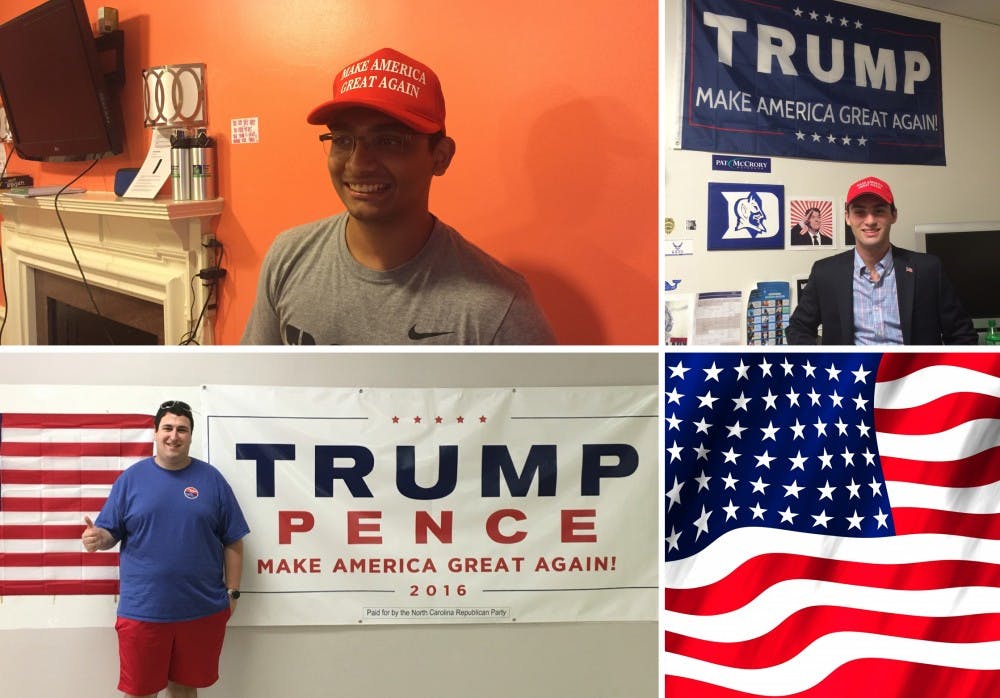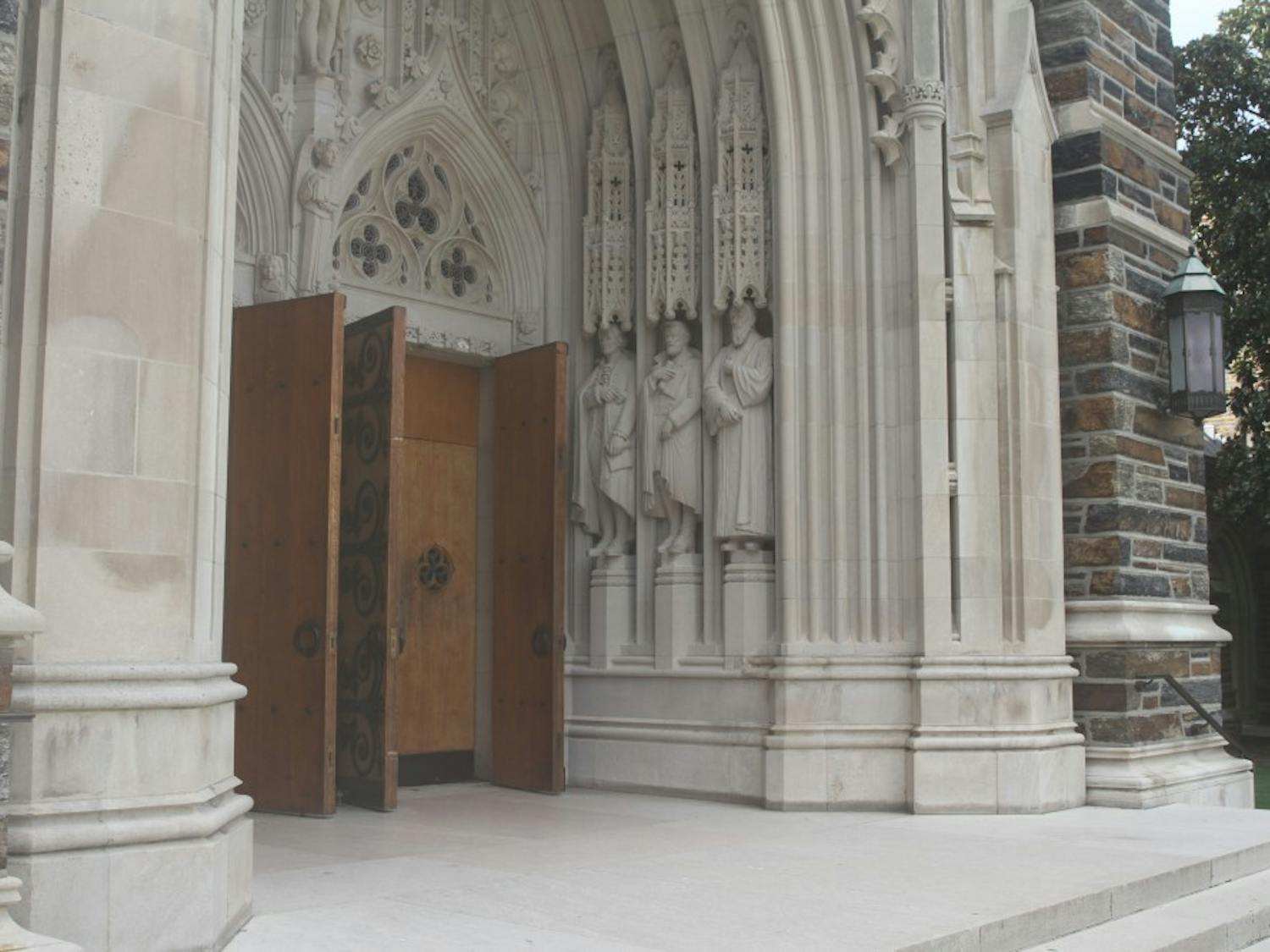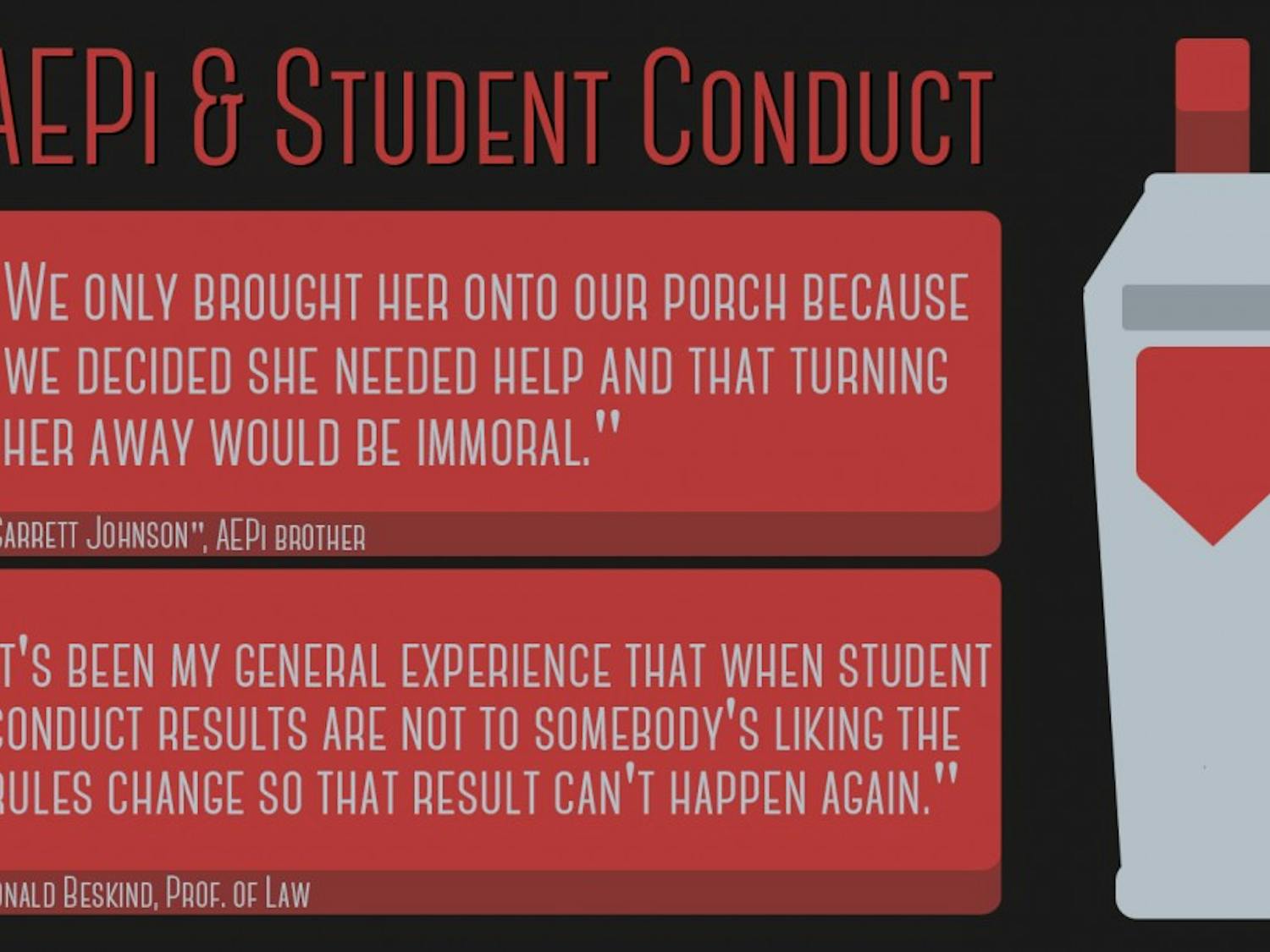UPDATE: In light of newly-released audio Friday showing Republican nominee Donald Trump bragging about groping women, several Republicans—including the chair of the national College Republicans organization—have withdrawn their endorsements. The Chronicle followed up with the people mentioned in this article to see if they still maintain their support. Berger, Ferlauto, Siegel and Sridhar all declined to comment. Hough explained in an email that he thought both Trump's and Bill Clinton's attitudes toward women are products of their generation so he was not surprised by Trump's comments. Hough added that he will probably not vote.
First-year Mitchell Siegel is a typical Duke student in many ways.
He’s from New York, lives in Giles residence hall and is interested in politics. But unlike most politically-engaged Duke students, Siegel isn’t a Democrat or moderate Republican upset with the current campaign. Instead, he’s a Donald Trump supporter.
The Long Island native says that although he was a cautious supporter at first and still thinks some of Trump’s rhetoric is “ill-advised,” he believes the Republican nominee is the strongest candidate on the issues he cares about most—the economy, immigration and national security. He added that he “leans left” on certain social issues but thinks they are ultimately up to states to legislate.
“The first reaction I get is, ‘You support Trump? How?,’” said Siegel, who explained that he has been vocal about his support on campus. “I give them reasons, and then they respect it.”
He said he’s had many conversations with students in his dorm about his support and added that although most disagree with his positions, they are willing to have a conversation and hear his views.
“My whole goal is to make it known that being a young conservative or a young Trump supporter is not a crime,” Siegel said. “It’s legitimate to be a Republican.”
And he said he’s not alone. Siegel described “a silent crowd” of Trump supporters at Duke, but noted few are willing to go public with their support.
“This is the most left-leaning place I’ve ever seen in my life, to be honest. But it doesn’t faze me. I’m willing to openly come out,” Siegel said. “Not all people who support Trump are bad. That’s a stereotype I’ve seen not just on college campuses, but everywhere. There are good people who support him.”
Towerview spoke to four student Trump supporters, including Siegel, and one Trump-supporting professor to examine what it is like to be part of this “silent crowd” on a predominantly Democratic campus.
The democratic Duke bubble
Siegel may have been right that a crowd of Trump supporters exists at Duke, and if it exists, he is right that it is—largely—silent.
Polling website RealClearPolitics shows Trump and Democratic nominee Hillary Clinton deadlocked in North Carolina, with Trump beating Clinton by less than one percent as of Sept. 27. If the race were held on Duke’s campus, however, it would be less of a nail-biter and more of a landslide.
During an anonymous and unscientific poll of 110 students in West Union last week, 85 students said they would vote for Clinton, seven said they would not vote, 10 said they were not sure who they would vote for, six said they would vote for Libertarian Gary Johnson and two said they would “probably” vote for Trump—adding that they would rather not talk more about it. That would put Trump’s support, at less than 2 percent among Duke students.
Even the Duke College Republicans have “abstained” from endorsing Trump.
The organization chose not to support Trump but also not to issue a statement condemning him, as the Harvard Republican club did. Sophomore Madison Laton, a vice-chair of the Duke College Republicans, explained that the 15-member executive board was “split” on what to do, so it decided to take a vote.
“Not endorsing Trump won,” said Laton, who is from Atlanta and currently undecided about who she will vote for. “Then we had to decide what that would look like, and we decided that we would not issue a statement like the one Harvard issued. So we just abstained from endorsing him.”
Ryan Fournier, the president of Students for Trump, confirmed that the student-run national organization—which has more than 250 chapters nationwide and is in contact with Trump’s campaign but not directly affiliated with it—has no representatives on Duke’s campus. He noted that the organization has a strong presence at North Carolina State University and a “growing presence” at the University of North Carolina at Chapel Hill.
“At Duke, not so much,” said Fournier, a sophomore at Campbell University, located in Buies Creek, North Carolina outside of Raleigh.
The reluctance to support Trump is not limited to students. For the most part, Republican professors have also chosen not to publicly support Trump—a fact all four of the student Trump supporters that Towerview interviewed pointed out.
Peter Feaver, professor of political science and a veteran of the George W. Bush administration, said neither he nor any professors he knew of were supporting the Republican nominee. Feaver was one of 50 top Republican national security officials to sign a letter condemning Trump as lacking “the character, values and experience” to be president.
Johnson supporter Michael Munger, a political science professor and the director of the philosophy, politics and economics certificate, also said he does not know any faculty who openly support the Republican nominee.
Only one professor, Jerry Hough, James B. Duke professor of political science, told Towerview he is “pro-Trump.” Hough has retired after teaching his last course on the American presidency this past Spring and is currently on leave.
The ‘silent crowd’
Hough and the four students interviewed—three undergraduates and one graduate school student—sometimes touched on similar themes, including the importance of ending political correctness and the need to reform the economy. Other times, they varied wildly from each other on their positions, especially on social issues.
Hough, who attracted national attention for his controversial statements regarding race in a comment on a May 2015 article in The New York Times, described himself as a “New Deal Democrat” who thinks Clinton’s positions on the economy and foreign policy are “too far right.”
“I wanted a responsible candidate who would go back to the policies of Nixon,” said Hough, who initially supported Vermont Sen. Bernie Sanders in the Democratic primary. “Clinton and [President Barack] Obama are way to the right of Nixon on economic issues, and Hillary is probably to the right of Bill [Clinton] and Obama.”
Obama himself said the same in 2014, saying “in a lot of ways Richard Nixon was more liberal than I was.”
Hough, who said he resigned prior to the controversy stemming from his comments on The New York Times article in May 2015, noted that he is currently being paid half of his salary as part of his retirement package.
“We’ve got two awful candidates, but Trump is the better of the two,” said Hough, 81.
He said he recognizes that Trump is unpredictable—and called anyone who tries to predict what the Republican nominee will do “a fool”—but said he thinks the economic and foreign policy positions Trump has taken are superior to Clinton’s.
So much student support for @realDonaldTrump across the country. It cannot be done without us! #MakeAmericaGreatAgain #AmericaFirst pic.twitter.com/ksHKYMJM0C
— Students For Trump (@TrumpStudents) September 28, 2016
Siegel and Nikhil Sridhar, also a first-year, described themselves as traditional conservatives who are mainly concerned with the economic policies of the two candidates.
“When you’re talking about free trade, it has to be fair trade,” said Sridhar, who was born in Virginia but lived in India for the last 10 years. “These people we’re competing against don’t follow any sort of regulation standards. I think the big thing about Trump is that it’s Americanism, not globalism. It’s time to put America first. We’ve given so much to the false song of globalism.”
Sridhar, who said his parents immigrated to the United States legally, explained that his international background has made him more aware of the concept of nationalism.
“You’ve got to love your country,” he said. “The great thing about Trump is that he said the era of nation-building is over. No other presidential candidate has said that.”
He echoed Trump’s stance on the ongoing conflict in Syria—which has led to more than 400,000 deaths and the displacement of more than four million people—arguing that the U.S. should build safe zones rather than allow refugees to enter the country.
“Their culture is not compatible with ours,” Sridhar said.
Like Sridhar, Harrison Ferlauto, a senior who described himself as a “paleoconservative,” also emphasized American nationalism and exceptionalism, describing the country as a “special place on Earth.” He accused Obama and Clinton of trying to make America more like Europe and said he wanted nothing to do with that.
“If I wanted to live in Switzerland or Sweden or Denmark, I would move there,” Ferlauto, who is from New York, said. “People aren’t storming into the borders of Denmark to try to live in Denmark, but they’re storming into the borders of the United States, and they have been since its inception. There is a reason for that.”
Ferlauto also noted that he likes Trump’s tax plan more than Clinton’s—although he personally believes the federal income tax is “illegitimate” and should be abolished altogether—and that he thinks Trump’s policies will best improve the job market.
He described a recent career fair at Duke as a “farce” and a “public relations event” and said it is too difficult for qualified college graduates to find jobs today.
“I don’t think that social issues are driving young people—I think what ought to be driving young people, and I think is driving young people, is the fact that it’s incredibly difficult to find a job,” Ferlauto said.
Ferlauto is socially conservative. He said that he views abortion as murder, and argued that drugs lead to the decline of society. When asked about protecting equal rights for the LGBT community, he said those rights already exist.
Jackson Berger, who has finished his coursework in the Masters of Engineering Management program and is currently finishing his independent study, also said he supports Trump because of his economic vision—but he differed sharply from Ferlauto on social issues.
The Maryland native, who attended Johns Hopkins University as an undergraduate and now volunteers for the Trump campaign in North Carolina, described himself as fiscally conservative and socially liberal. He noted that he was a registered Democrat, and even voted for Obama in 2012.
“Trump is the first Republican nominee who really isn’t interested in social issues that much,” Berger said. “His entire campaign is based on big picture issues like immigration, the economy, national security, fighting terrorism—those kinds of issues.”
The Republican nominee has said that transgender people can use whichever bathroom they choose in Trump Tower, but has made conflicting statements on how he views North Carolina’s controversial House Bill 2, which makes transgender people use the bathroom of their biological sex.
Berger added that issues like these are “not defining our time” and that he appreciates that Trump has not dwelled on them.
“I think our country is really at a precipice in terms of the direction it is going to go,” Berger said. “Are we going to go more toward a socialist economy, or are we going to reinvest in America and make business thrive again?”
Sometimes, those interviewed sounded like Trump at his most unfiltered.
“Millennials are a bunch of communists,” Sridhar declared, discussing Trump’s lagging support among voters.
Ferlauto compared abortion to the Holocaust, and insisted that history would prove him right.
“Historians will look at us as a generation that committed an atrocity against mankind, in the same way we look at Nazis who committed acts of atrocity against mankind,” he said.
A ‘hostile’ environment?
The students also differed in their experiences as vocal Trump supporters on campus.
Sridhar described the climate on campus as “hostile,” noting that people usually introduce him as a Trump supporter, which leads to a “starting point to hating on Trump and his supporters.”
“People are pretty hateful,” he said.
Ferlauto suggested that the environment on campus stifles Trump supporters. He said there is a “significant silent group” on campus that supports Trump, but that they remain silent because “it’s the only rational thing to be.”
“If you’re not silent, you run the risk of hurting yourself, hurting your career, hurting your standing among institutions that are, at the present, controlled by leftists,” he said.
But Siegel said that in his experience, students on campus are generally willing to listen to viewpoints different from their own—as long as you approach them in a specific way.
He said his strategy when discussing political views is to be calm, honest and realistic.
“Most people are willing to listen as long as you’re calm and say things practically and without trying to insult people,” he explained.
Berger said that the campus “obviously leans left,” noting that almost all colleges do, but said he never experienced substantial hostility because of his support for Trump.
“I know at a lot of college campuses, to support Trump makes you a social pariah,” he said. “At Duke I never found that to be the case.”
The fight for North Carolina
The Trump supporters interviewed by Towerview had a range of predictions for who will win North Carolina—which went to President Barack Obama in 2008 and Mitt Romney in 2012—but all said it is going to be close.
Berger, a field organizer for Trump in North Raleigh, noted that one of the “phenomena of the Trump campaign has been that he’s bringing out people who haven’t voted before or typically don’t vote.”
In terms of strategy, that means the campaign isn’t just targeting the Republican base, but also those who might not typically be the target voter, Berger said.
Siegel, who doesn’t think experts can accurately predict the election, said that the race for North Carolina will be close—and added that“Trump needs it more than Clinton does.”
“If Clinton takes North Carolina, it’ll be a big blow for Trump,” he said.
The state is one where the youth vote could have one of the biggest impacts in the country—as it did in 2008, when young voters propelled Obama to a close victory.
A CBS survey conducted Aug. 30-Sept. 2 showed that 57 percent of 18-29 year-olds in the state said they would vote for Clinton if the election were being held today. Nineteen percent said they would vote for Trump.
But Sridhar expressed only optimism—for the outcome of the race in North Carolina and for the outcome of the national race.
“We’re going to win, and we’re going to win big,” he said.
“Believe me,” he added, echoing the favorite line of his favorite candidate.




